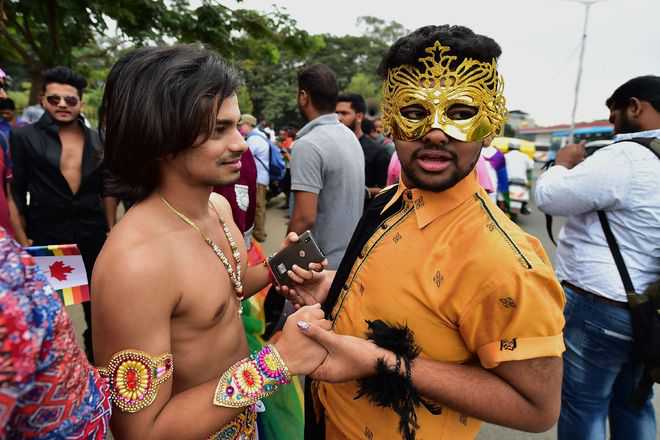
Various hues of love: The book, a compilation of essays, explores ways in which the changing trajectories of women’s lives and queer people’s lives foreground the gulfs of a sharply altering India
R. Bharat
The recent spate of #Me Too protests globally underscored the problematic terrain of the world’s accelerating changes. India, negotiating its post-independence state over 70 years, is caught in this interstice of global changes altering and remapping the coordinates of national identity and a complex past to be processed and amalgamated holistically. In this strife, the position of minorities, women, caste and religious categories play a huge part. Brinda Bose tackles these unresolved areas through conceptualising pleasure as audacious, insouciant, breaking the boundaries of caste, class and sexuality that have constituted India’s irresolute identity struggle.
The rise of the BJP, attributable to many complex factors, including a certain conservatism and backlash palpable globally against neo-liberal globalisation’s destabilising disorientations of previous paradigms of masculinity, sexuality, feminism, becomes a fraught space. Culture, morality, realpolitik intersect in often oppressive and challenging configurations as an uncertain future, to be treaded by encompassing a turbulent multifaceted present, becomes a necessity.
Basing her exploration of the rambunctious subversion of pleasure, desire and sexuality through the frameworks of queer theory, feminism, cinema, globalisation, diaspora, translation studies, these essays explore ways in which the changing trajectories of women’s lives and queer people’s lives foreground the gulfs of a sharply altering India. The country is seeing a defensiveness against the proliferation of multiplicity of life choices and opportunities, including career and sexual freedoms, hitherto inaccessible. Various essays highlight the focus points of past and present, tradition and modernity, the imperial past and the global present.
These treatises traverse the whole spectrum — from the written to spoken word, from writings of Arundhati Roy to Taslima Nasrin to Gayatri Spivak to Mahasweta Devi, from films of Satyajit Ray to Deepa Mehta and Mira Nair, as well as a spiralling outward of themes from within India to Asia to the globalised multicultural world.
Spanning these essays are novels, films, definitive cultural moments such as the overturning of the Delhi High Court judgement decriminalising Section 377 by the Supreme Court in 2013 to the kiss of love protests, campaigning for the rights of sex workers and the 2014 judgement acknowledging the presence of transgender people as a category. Bose delineates convoluted, riven landscapes of desire, intimacy, eroticism and choices, both represented and lived through art, ideas and life. The right to pleasure, the undermining of oppressive normative paradigms through the arbitrariness and unruliness and transformative power of sexuality is the accompaniment to these essays that straddle art, linguistics, sociology, culture and politics.
Queer erotica, working through the pressures of self-censoring for women writers and the way sexualities as a mode of study in the liberal arts, makes for a salutary critical space, as does the inhabitation of a queer, borderless coexistence with variegation. But for this to be made actualisable by celebrating and examining the ways, pleasure, desire and multitudinous intimacies dismantle stratified structures makes for a simplistic reading of human relationality.
That the arena of pleasure could be worked with moderately, or through choosing pathways not necessarily oppositional or confrontational is unexplored. Given the intractability of social coercions and oppressions of a post-capitalist global world and the changing face of the third world, these finely nuanced essays somewhere founder on formulating as workable options that might seek a synthesis that might be contingent and temperate. The dichotomy of the apparatus of the state and its shut-down of any alternative deviation, overt or covert, is persuasively argued and elucidated. But pleasures, desires, for all their undermining capabilities, work as much in the realm of the real, of individual choices which can retract, evolve, grow or collapse as much from pressures within as without, where external reality may not be as insuperable a force as the relational intimate other herself/himself.
Apart from these minor quibbles, these essays make for fascinating reading. The broadening of frames of reference within academia and the inclusiveness of the queer are viable considerations. The Audacity of Pleasure makes a thoughtful case for the inclusion of the desiring body, subject and lived experiences of loss, risk, absence into the citadels of left and academic annals. Narratives of pleasure are consolatory in their inconsolability, yield momentary yet profound hope and resisting determined oppressions, still endure. Can these pleasures undergo their own reconfiguration by changing the unequal, evolving India of today remains a big ask.



























